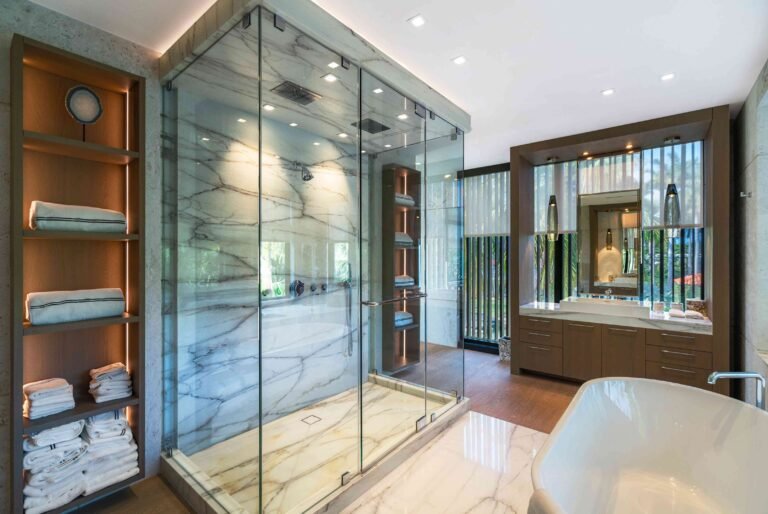:max_bytes(150000):strip_icc():format(jpeg)/Houseof1-628409668f254e4181356911045b8f4a.jpg)
In recent years, homeowners have become increasingly interested in showers that function as home spas with a variety of luxurious relaxation features, from built-in seats and keypad controls to full-body jets and especially steam showers.
Saunas often provide a relaxing experience in any bathroom, so we’ve created a guide to help you make the decision to install a sauna and what to consider if you’re considering one.
What is a sauna?
A steam room is a completely enclosed bathing space equipped with a steam generator to provide similar functions to a sauna room commonly found in a spa or health club.
While a sauna is easier to build when starting a new construction project, you can incorporate a sauna into an existing bathroom by installing a steam generator, enclosing, insulating, and sealing the steam in the bathroom.
Want more design inspiration? Sign up for our free daily newsletter for the latest decorating ideas, design tips, and more!
How does a sauna work?
The steam generator, usually about the size of a suitcase, is installed somewhere outside but close to the bath, such as in an adjacent closet space or in a wall recess. It needs to be connected to a water line as well as an electrical source, as it uses electricity to heat the water.
It also requires a pipe connection to the shower enclosure. Water flows into the generator, which, when activated, heats the water to its boiling point (212 degrees F or 100 degrees C) to create steam (steam). The steam is then released through the pipe to the shower, exiting through a steam head mounted on the shower wall.
While the generator needs to heat the water up to 212 degrees F, the temperature generated in a closed sauna does not exceed 120 degrees F (assuming properly functioning sensors are installed) to ensure user safety.
In addition to the sauna, some homeowners often choose to incorporate other spa-like amenities such as chromotherapy using colored lights and aromatherapy using essential oils.
Advantages and disadvantages of sauna
Grandma Maite
Advantage
- Saunas bring spa-like relaxation right to your home.
- A sauna adds a touch of luxury to your home and can potentially increase the value of your home if you ever want to sell.
- Water usage can be reduced by using a steam shower, followed by a quick wash and rinse.
Defect
- The cost is quite expensive: the majority of the cost is installation fees.
- It uses electricity and thus increases energy usage and bills with every use.
- More maintenance: You’ll need to clean your shower more frequently and meticulously to avoid mold. (Not to mention, you’ll also need to clean the generator inside every few years to keep it running smoothly.)
- There is a possibility of water damage to the bathroom if the gasket is damaged.
How to install a sauna
Prefabricated kits are the most cost-effective, but remember that in addition to the kit, you will still need to hire a contractor, plumber, and electrician to install it properly. Alternatively, you can install it yourself, but you will still need to hire a plumber and electrician to wire it up properly.
Prefabricated units cost between $2,800 and $7,100 and typically include the generator, accessories, steam header, and inserts (walls, doors, base, and drains).Sometimes, shower kits include common shower components such as a showerhead, ceiling-mounted rain showerhead, body spray, and seat.
On average, the initial prefabricated unit is about 9 feet square and 7 feet tall. Labor costs, which will of course vary by region, add up to more than $500.
Current shower cost
If you have an existing shower that fits into the steam room space, meaning it can be enclosed and separated from the rest of the bathroom space, you may choose to hire a contractor to convert the space and install a steam generator, steam head, and separately purchased controls. The average cost to convert a shower is about $4,300 (including equipment, steam generator, and labor).
Custom Sauna Cost
A custom shower is the most expensive option and may be unavoidable if you want to renovate an existing shower space that is atypical in size or if you desire specific aesthetics that a prefabricated kit cannot provide, such as higher-end materials, finishes, and smart controls.
In addition to the generator package and the usual shower components (drain, base, showerhead, body spray, and temperature controller), you may need to consider additional costs that come with it.
You’ll need a glass wall built all the way to the ceiling (which can cost $700 to $1,900 depending on the size and thickness of the glass), glass doors ($550 to $1,350), and finishes like porcelain tile or stone (prices per square foot vary depending on product selection). Other additions you may want to add include shelves, speakers, benches, stools, and lighting.
Finally, there are different labor costs for each type of contractor/subcontractor involved. The average cost of a custom sauna is between $4,000 and $14,200 (including materials, generator set, and labor).
